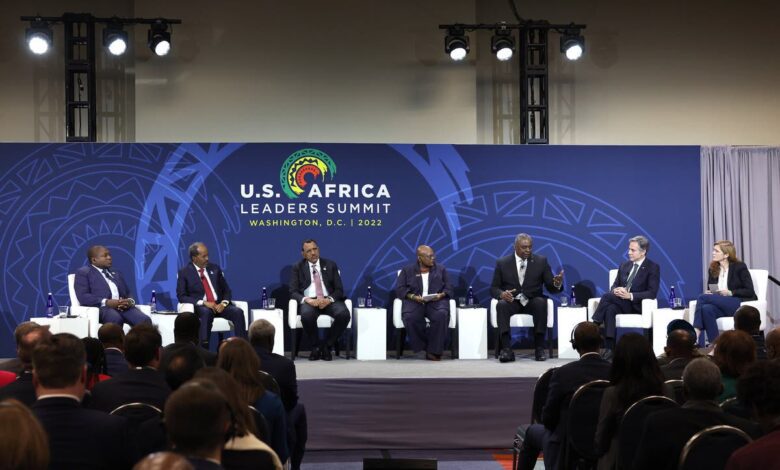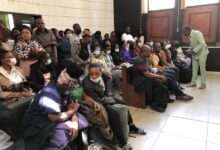Uninvited Zimbabwe Loses on USA Investment
Zimbabwe, 5 African nations not attending US-Africa Summit

African leaders are in Washington this week for high profile meetings with US President Joseph Biden but a few of their counterparts did not make the cut due to restrictive measures imposed by Washington for allegedly violating human rights and failing to conduct free, fair and credible elections.
In some African states, the US imposed targeted sanctions on suspected terrorists and terror groups operating on the continent and beyond.
Zimbabwean President Emmerson Mnangagwa is among the few African leaders not attending the USA-Africa Leaders’ Summit because of targeted sanctions imposed by Washington for human rights abuses by his regime. Foreign Affairs Minister, Ambassador Frederick Shava, is representing Zimbabwe, which is featuring for the first time at the summit.
“As my government continues to entrench democracy, good governance and the rule of law, we are committed to vibrant, competitive and peaceful political contestations. Notwithstanding our success, the ongoing deleterious effects of the illegal sanctions continue to hamper and slowdown our progress and the realization of sustainable and inclusive development.”
Over the past few years, the Zimbabwean government has campaigned against the targeted sanctions, claiming that they were hurting the country’s economy. Harare has managed to secure support from several African leaders, including President Mokgweetsi Masisi of Botswana.
“While we are confident to the resilience and resolve of Zimbabwe as well as its economic transformation prospects, we are concerned that such measures are not advancing the livelihoods of innocent Zimbabweans.”
Jeff Flake, former Arizona Senator, who lived in Zimbabwe for many years, said he drafted a piece of legislation for the imposition of the restrictive measures, following allegations of human rights abuses and election rigging.
“I have long-wished Zimbabwe to prosper in a manner that its people deserve. What happened in the country since I lived there in 1983 is nothing short of tragedy. That’s why I along with Senator Coons introduced the Zimbabwe Democracy and Recovery Amendment Act and the bill reinforces the markers that the new government needs to meet in order to forge a better bilateral relationship with the United States.”
The U.S. Department of the Treasury’s Office of Foreign Assets Control says restrictive measures in Zimbabwe are targeted at human rights abusers and those who undermine democratic processes or facilitate corruption. It adds that the sanctions do not target Zimbabwean people.
The White House says five more countries were not invited. The African Union suspended Burkina Faso, Mali, Guinea and Sudan over military coups. Apart from Zimbabwe, Washington has also backed restrictive measures imposed on some individuals by the Economic Community of West African States following a series of coups in Mali. Moustapha Diaby, a geo-political analyst, explains:
“USA did not impose any sanctions on Mali. When ECOWAS proposed sanctions, USA said they would observe. If you remember the meeting between USA and Africa, the Secretary of State Anthony Blinken said ‘we’re going to give African people an alternative against Russia and China’ and so African governments have already said that they will not accept anybody to dictate to them what they want to do. So, USA is very careful about imposing sanctions against Mali because if you wanna make somebody approach you, you don’t wanna be punishing against that community. So, U.S. is not truly going to (directly impose) sanctions. They are observing what ECOWAS is proposing as sanctions against Mali.”
Diaby says imposing sanctions on African nations derails America’s democratic agenda worldwide.
“Any West sanctions against any African country won’t be good sanctions because, remember, all our economic systems depend on the dollar currency and Euro. And if there are any sanctions coming to us, our economy does not support it because those economies also depend on loans and foreign aid. In Mali, foreign aid has an impact on the national budget. So, if you have any sanctions from the West, there will be a collapse of countries in ECOWAS and the African union. We strongly depend on them but there should always be some negotiations. If the West does not want African states to go to Russia or China, there is need for them not to impose sanctions on them.”
Some individuals are also on targeted sanctions in the Democratic Republic of Congo following political instability in the country, which has vast natural resources. Some of them are M23 rebels. Ntal Alimasi, an international development professional and published researcher, says some individuals in the DRC are facing restrictive measures even though it appears as if the sanctions are not being enforced by the Treasury’s Office of Foreign Assets Control.
“What they did here, they specified that the Secretary of State if he determined that, you know, individuals either in the government or I guess foreign countries, were harming the security of the DRC or were harming the UN Security forces or were recruiting or utilizing child soldiers, etc, could at that particular point be under the sanctions from the Treasury Department. What we know is that these sanctions were imposed on the former head of the CENI (Independent National Electoral Commission), which is the independent commission from the DRC. We know that these sanctions were imposed that time on General (Francois) Olenga, who headed the DRC army when they won against the M23 in 2013. I know there have been sanctions imposed on the current head of the M23 who is Sultani Makenga …”
But Alimasi believes that the sanctions, which have also been targeted at individuals in the DRC, are not effective enough to quell violence in the region.
“We have yet to see this law applied and sanctions imposed on individuals that are known, for instance, Sultani Makenga is known, I mean he has been on the sanctions before, why has anything been done against him. Nobody knows about that and why the United States is not acting on it. We know that the M23 gunned down a helicopter of the MONUSCO and some of the peacekeeping forces were killed but still there was nothing that was done on the US side.”
The United States also designated four members of an Islamic State of Iraq and Syria cell operating in South Africa, who have provided technical, financial, or material support to the terror group. The Treasury’s Office of Foreign Assets Control says the four are associates of Treasury-designated ISIS cell leader Farhad Hoomer, who it says, continues to pursue the objectives of the terror group in Southern Africa, seeking to harm U.S. and its allies. Some companies linked to the group are also under the restrictive measures.
From 2014, America also imposed targeted sanctions on former leaders and militia commanders in the Central African Republic for prolonging instability. These include 2003 coup leader and former President Francois Bozize, former Transitional President of the Central African Republic and Michael Djotodia, leader of the Seleka Rebellion and others for prolonging instability in the country.


























